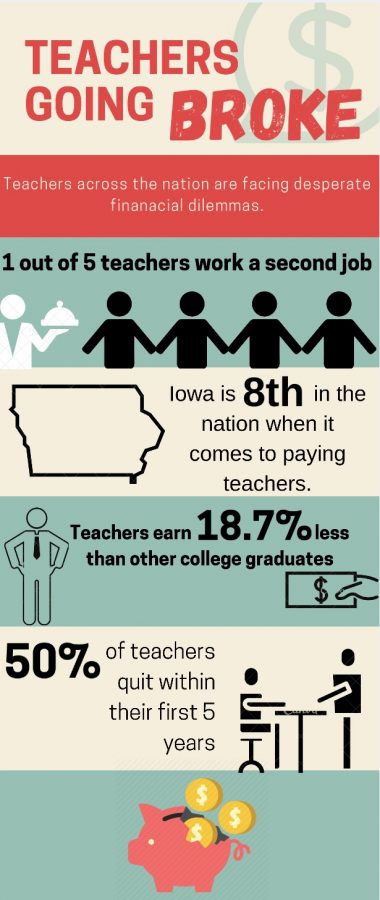Teachers Tapped Out
Salaries have been frozen for teachers within the district.
Teachers often struggle when it comes to finances, however Iowa pays teachers fairly well.
May 20, 2019
On average, teachers have $26,792 in debt, are paid less than other college educated graduates, and are rarely given adequate funding for classroom materials. As a result many teachers are finding themselves to be in financial trouble. “We are definitely not teachers for the money,” Geometry teacher Alexandra Jacobson said. “I spend hundreds of dollars a year on my classroom. I feel like as a young teacher I like to spend it, but I know in the future that just really won’t be possible for me in the budget as I have my own family and kids and more expenses.”
The Johnston Community School Districts’ average teacher salary is $43,011, while Johnston’s average income per family is $94,821. For the past couple of years, Johnston teachers have endured another financial blow, and have had their salary frozen through an extended five year contractual agreement.
World studies and AP US History teacher Jessica Dowell has been teaching in the Johnston School District for 12 years, and has seen her salary stagnate for the past couple years. “Due to changes to collective bargaining and a multi-year contract, the district said we have to cap what we are able to put towards increased insurance premiums and so, not as much money has gone into those kinds of things,” Dowell said. “I’m continuing to move down the step increases in terms of years of service, but I’m only bringing home about $100 more (a) month (than) the previous year. That’s not necessarily a Johnston thing, that’s a state of Iowa thing.”
Normally, teachers earn more money the longer they teach in a district, and also receive a salary increase if a masters program is completed. Dowell is pursuing her masters degree next year to try and bump up her salary. “What people don’t realize is that there is constant additional training,” Dowell said. “You’re taking certifications, classes, there’s constant professional development that you are going through. They’re constantly changing standards…teaching requires as much continuing education as some other professions, but it doesn’t get looked at the same way. It’s that old adage of ‘if you can’t do, you teach.’ So, I would say there is a little bit of disrespect for the profession. I wouldn’t say that’s common in Johnston, but nationwide.”
Teachers often invest money out of personal savings towards classroom materials, which strains finances even further. “I love having candy available for students and always like to give that out, our classroom decor is pretty much all out of pocket.” Jacobson said. “We will receive a couple posters here and there, but it’s not much to give your room character. We get to input what supplies we will need next year, but that doesen’t guaruntee we get it or that we can get the quantity that we really need or want.”
Many teachers also work long hours outside of school grading tests, and preparing lesson plans. “If we were just working a traditional 9 to 5 salary job and we didn’t have things we have to take home, then yes, we would probably be getting overpaid,” Dowell said. “But… most teachers are working somewhere in the neighborhood of a 50 hour week or more, and that doesn’t count additional things like conferences or if teachers help to chaperone school dances.”
Teacher salaries are formulated by the state, as funding to school districts is determined by legislatures. “I don’t blame administration for our pay, I just know it’s higher up than them,” Jacobson said. “I wish there was more money that was funded for us. I think if it was up to administrators, administrators would like to pay us more, and they would like to be paid more…it does make us feel underappreciated when we don’t make the money we feel that we deserve for the work we are putting in.”





